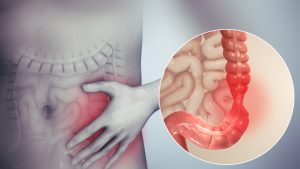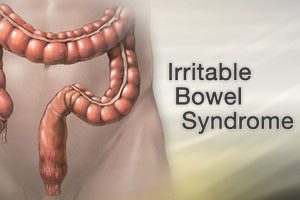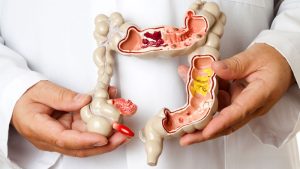
IRRITABLE BOWEL SYNDROME
Irritable bowel syndrome. A collection of symptoms affecting your digestive system is known as irritable bowel syndrome. Your intestines are affected by this common yet painful gastrointestinal disease. Abdominal pain and cramps are among the symptoms that people with IBS encounter. You might also experience constipation, diarrhea, or both frequently if you have IBS. IBS doesn’t raise your risk of developing more severe illnesses like colon cancer or harm the tissue in your gastrointestinal (GI) tract.
IRRITABLE BOWEL SYNDROME
Rather, it’s a chronic (long-term) illness that most people can control with medicine, behavioral treatment, and dietary and routine changes. Abdominal discomfort or pain is a symptom of irritable bowel syndrome, or IBS. Common signs of IBS include bloating, gas, diarrhea, and constipation. Your colon cancer risk is not increased by IBS, nor does it harm your digestive system. With medication, diet, and lifestyle modifications, symptoms can frequently be controlled.
Signs

IBS symptoms can show up often. They might also happen during flare-ups. To put it another way, symptoms are not always present. Alternatively, the symptoms can disappear and your bowel movements will return to normal. Other times, the symptoms come back.
IBS symptoms and indicators include:
cramping or pain in the abdomen, typically associated with the urge to urinate.
Bloating and too much gas.
Constipation, diarrhea, or a combination of the two.
Your stool may seem white due to mucus.
having trouble emptying your bowels following a bowel movement.
Causes

Dysmotility: Issues with the contraction and passage of food through your gastrointestinal tract may be present. People with IBS tend to have greater contractions in their colon (large intestine) muscle. Pain and cramps are caused by these contractions.
Visceral hypersensitivity: Your GI tract’s nerves may be overly sensitive. Compared to those without IBS, those with it typically have a lower pain threshold. You may be extremely sensitive to pain or discomfort in your abdomen.
Gut bacteria: Studies have revealed that persons with IBS may have different bacteria in their gastrointestinal tract, which might exacerbate their symptoms. Research has indicated that individuals with IBS have different gut bacterial species and quantities than those without the condition.
Severe infections: Some persons are diagnosed with IBS following a severe gastrointestinal tract illness, which may indicate that bacteria are involved.
Food intolerance: IBS may be exacerbated by food allergies or sensitivities.
Stress throughout childhood: People who have significant stresses during their childhood, such as emotional, sexual, or physical abuse, are more likely to have IBS.
Treatment

Incorporate more fiber into your diet. If constipation is a problem for you, foods high in fiber, such as fruits, vegetables, grains, prunes, and nuts, can assist. Give your stomach time to adapt by introducing fiber gradually into your diet.
Increase your intake of dietary fiber. Alternatively, you could try fiber supplements such as Citrucel® or Metamucil®. Steer clear of dairy goods like milk and cheese. Those who have IBS are more likely to be lactose intolerant. Eat nondairy foods high in calcium, such as salmon, spinach, or broccoli, if you reduce your intake of dairy.
Summary
Gas, constipation, diarrhea, and stomach pain are all unpleasant symptoms of IBS that can disrupt your life. IBS, however, is controllable. By altering your diet and daily routine to better manage triggers, you can alleviate your symptoms. Speak with your healthcare practitioner if you have persistent stomach symptoms. Together, you can discover a treatment strategy for IBS that suits you.